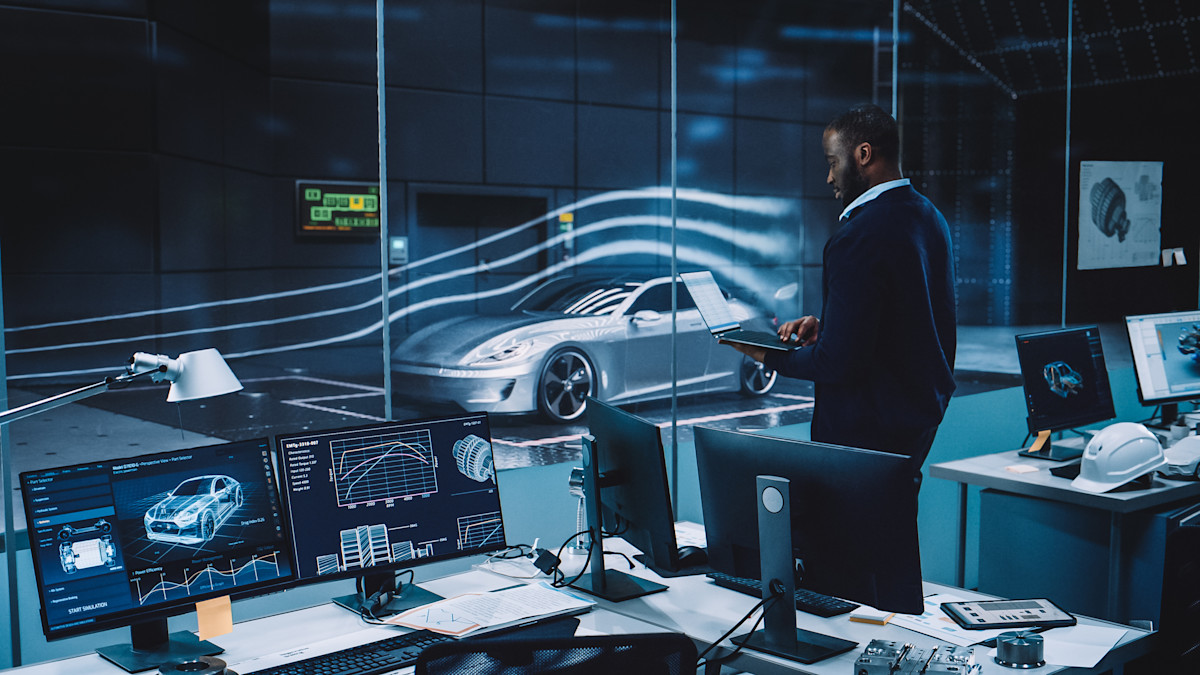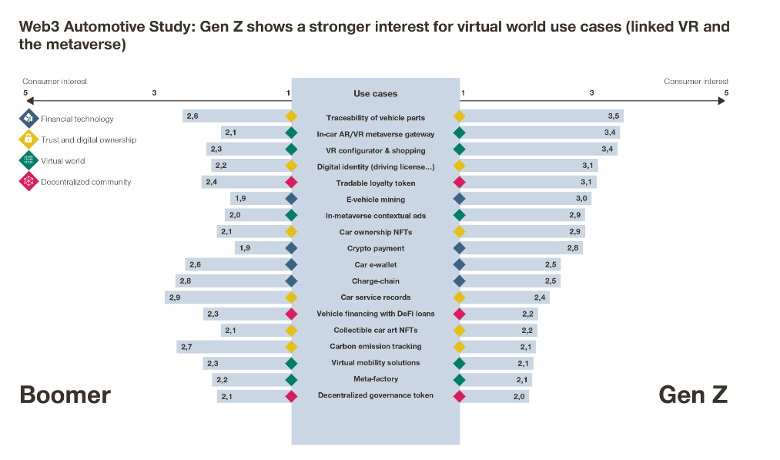Sep 20, 2023
Driving into the future: Revolutionizing the automotive industry with web3

The automotive industry is undergoing a transformation that’s being accelerated by the advent of Web3 technologies. Web3, also known as the decentralized web, offers unique opportunities for automotive companies to enhance their operations and provide innovative services to consumers.
Leveraging blockchain, smart contracts, and other decentralized applications (DApps), the automotive industry can benefit from increased transparency, improved data management, and enhanced user experiences.
Let’s explore the potential applications of Web3 in the automotive sector and examine the perspectives of different generations.
Web3 Opportunities for Automotive Companies
Supply Chain Transparency: Blockchain technology enables the creation of transparent and immutable records of every transaction within the automotive supply chain. This ensures that all parties involved, from manufacturers to suppliers, have access to real-time information, enhancing efficiency and trust.
Track Car Ownership / User Data: Utilizing blockchain-based solutions, automotive companies can securely track car ownership and other user data. This tamper-proof digital record can include such information as ownership history, mileage, and service records, reducing fraud and improving the resale value of vehicles.
Feature Subscription as NFT: Web3 allows automotive companies to offer feature subscriptions as non-fungible tokens (NFTs). This enables users to customize their vehicles with additional features and transfer these subscriptions seamlessly between owners and vehicles, providing a flexible and personalized ownership experience.
CO2 Mobility Certificates: The automotive industry is increasingly focused on reducing carbon emissions. Web3 can facilitate the creation and trading of CO2 mobility certificates, allowing companies and individuals to track and offset their carbon footprint associated with transportation.
Predictive Maintenance: By integrating IoT sensors and blockchain technology, automotive companies can implement predictive maintenance systems. These systems collect real-time data from vehicles, analyze it using smart contracts, and provide proactive maintenance recommendations, optimizing vehicle performance and reducing downtime.
Real-World Use Cases
A few brands are leading the way in embracing Web3 to engage their audiences, offer unique collectibles, and create interactive experiences in the digital realm. Here are some notable examples:
BMW introduced audio-based NFTs capturing the sounds of their engines on the Polygon blockchain.
Lamborghini releases monthly NFT drops with time-limited availability and surprises for collectors.
Porsche offers a chance to win a Porsche 911 Carrera through NFTs, combining luxury cars with digital collectibles.
McLaren provides NFTs for fans to join their community and explore a virtual racing environment.
Rolls Royce collaborated with an artist to design a collection that combines physical cars with embedded NFTs.
Volkswagen created a treasure hunt–style NFT experience for enthusiasts in South American markets.
Alfa Romeo introduced an NFT digital certificate for their Tonale SUV to enhance its residual value.
Renault launched an exclusive NFT collection to celebrate the 50th anniversary of the Renault 5 on their Web3 platform.
Ducati partnered with a white-label NFT platform to offer immersive experiences to motorcycle enthusiasts.
The Consumer Perspective
According to a survey conducted by Simon-Kucher, there is a noticeable generation gap in understanding and valuing Web3 in the automotive industry. Younger generations, like Gen Z and Millennials, are more aware and enthusiastic about these technologies. Embracing Web3 and the metaverse can help the industry stay competitive and cater to younger demographics.
They see value in personalized experiences and social interactions. Automotive companies should invest in virtual showrooms and customized car configurations to meet the preferences of younger consumers. However, privacy concerns and limited infrastructure pose challenges.

Credit: Simon-Kucher
Different generations have varying perspectives on the applications of Web3 in the automotive industry. Let's explore the top five applications for Boomers and Gen Z:
Top 5 Applications for Boomers
Car Service Records: As mentioned above, blockchain technology provides a tamper-proof digital record of ownership, mileage, and service history. This ensures transparency and simplifies the process of selling or buying a used vehicle.
Charge-Chain: A blockchain-based module in the vehicle enables a universal charging and payment system for electric vehicles. This lets drivers charge their vehicles anywhere, streamlining the electric vehicle charging experience.
Carbon Emission Tracking: Blockchain records provide an overview of CO2 emissions, allowing drivers to monitor and reduce their environmental impact associated with vehicle usage.
Traceability of Vehicle Parts: Blockchain enables the tracking of vehicle parts, ensuring transparency and authenticity. This can enhance consumer trust and facilitate efficient recall management.
Car E-Wallet: A blockchain-powered car e-wallet automatically makes small payments for services like parking, toll fees, or gas purchases, offering convenience and seamless transactions.
Feature Subscriptions: Automotive features such as auto-pilot, car-seat heating, and other advanced functionalities can be offered as subscription services based on individual needs. Web3 technologies, specifically NFTs, enable the seamless management and transfer of these feature subscriptions between different owners and vehicles.
Top 5 Applications for Gen Z
Traceability of Vehicle Parts: Similar to Boomers, Gen Z values the ability to track vehicle parts, ensuring authenticity and supporting sustainable practices.
In-Car AR/VR Metaverse Gateway: Passengers can enjoy immersive gaming experiences that incorporate the vehicle's movements, merging the physical and digital realms.
VR Configurator & Virtual Sales: Through an enhanced car-buying experience, consumers can explore and virtually configure new cars using VR technology, enabling them to visualize and test different options from home.
Digital Identity: Web3 technologies enable digital driver's licenses, allowing for secure and portable identification that can be easily accessed and verified.
Tradable Loyalty Token: Automakers can issue digital tokens to consumers as a form of loyalty reward. These tokens can be earned through various activities and can be redeemed for perks such as discounts, exclusive experiences, or even traded on exchange platforms, providing an additional incentive for brand loyalty.
Challenges of Web3
While Web3 technologies offer significant opportunities for the automotive industry, some challenges need to be addressed for successful implementation, including:
Data Privacy: As the automotive industry collects and utilizes vast amounts of data, ensuring the privacy and security of this data becomes crucial. Web3 solutions must prioritize robust data privacy measures to protect user information and prevent unauthorized access.
Smart Contract Code Quality: Smart contracts, which are self-executing contracts with predefined rules, are an integral part of Web3 applications. Ensuring the quality and reliability of smart contract code is essential to avoid vulnerabilities and potential exploits that can impact the functioning of the automotive ecosystem.
Blockchain Integration with Third Parties: Integrating blockchain technology with existing automotive systems and third-party stakeholders can be complex. Achieving seamless integration and interoperability requires collaboration and standardization efforts to ensure a smooth transition and compatibility between different systems.
The Bottom Line
The convergence of Web3 technologies and the automotive industry presents exciting opportunities for both automotive companies and consumers. From enhancing supply chain transparency to revolutionizing ownership experiences, Web3 can reshape the way we interact with automobiles.
However, addressing such challenges as data privacy, smart contract code quality, and blockchain integration is crucial for the successful adoption of Web3 solutions in the automotive sector. By overcoming these challenges, the industry can unlock the full potential of Web3 and deliver innovative, secure, and personalized experiences to consumers.
Contact Us
Let's talk!
We're ready to help turn your biggest challenges into your biggest advantages.
Searching for a new career?
View job openings
